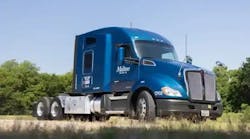Proposals to tighten commercial driver's license (CDL) programs at the state and federal level will surface soon as the Federal Motor Carrier Safety Administration (FMCSA) starts implementing federal laws that require closing loopholes in the CDL program to keep unsafe drivers off the road.
“CDLs will be a major activity area for us and the states over the next several years,” says Brian McLaughlin, director, office of policy, plans & regulations, FMCSA. He says that initiatives mandated by the Motor Carrier Safety Improvement Act, which was passed by Congress in 1999, will begin during the first quarter.
McLaughlin notes that DOT is sensitive to the driver shortage issue and knows that some of the proposals may exacerbate the problem. But, he adds, “Our main concern is safety. We can't run the risk of improperly licensed people driving … The potential results are too serious.”
McLaughlin chaired a recent study that looked at how Illinois and Florida ran their CDL programs. The study showed improprieties in both states' programs that were brought to light in 1998 through a joint criminal investigation by DOT, the FBI, State Police, the U.S Attorney's Office and other agencies of Illinois' CDL program. The investigation uncovered fraud by state employees who took bribes from third-party testers for CDLs. The inquiry spread to Florida after it was learned that applicants were traveling there from Illinois to obtain fraudulent CDLs, which were then exchanged for CDLs in Illinois. To date, 39 people have been indicted and 28 convictions handed down. Of the 39, 18 are current or former Illinois state employees.
To McLaughlin and others at the agency, the most important aspect of the investigation was that that it showed that fraudulently licensed drivers were involved in at least nine fatalities in Florida and Illinois, as well as an undetermined amount of property damage. “There's no reason to believe that fraud is rampant throughout the CDL program in the U.S., but what happened in Florida and Illinois is a wake-up call for all of us that the opportunity for fraud exists, and we need to address it,” says McLauglin.
Indeed, with more and more states outsourcing their CDL training to third parties, the need for state oversight will increase. In Florida, for instance, 85% of CDL testing is handled by third parties.
McLaughlin notes that although out-and-out fraud is one issue that needs to be faced, loopholes that allow poorly qualified, yet legal, drivers to get behind the wheel is another. In March 1999 in Bourbannais, Ill., a tractor-trailer and an Amtrak train collided at a grade crossing, killing 11 people. Even though the truck driver's license had been suspended prior to this incident, under Illinois law he was able to drive using a special “hardship” license.
Although the report details dozens of conclusions and recommendations that will form the foundation for FMCSA's CDL focus this year, McLaughlin said his agency will attack three areas first: closing the loophole of hardship licenses; eliminating split privileges; and preventing violation “masking,” where a violation in one state does not show up in other states' records.
These areas could be politically tricky, and may serve as lightening rods for the trucking community, which is already grappling with a driver shortage. For example, by eliminating split privileges, a commercial driver who is convicted of a violation while driving a passenger car may find the conviction a factor in losing his CDL. Some industry officials believe that the two issues should be kept separate, arguing that violations committed in a private vehicle do not necessarily lead to unsafe driving in a commercial vehicle.
Another hot potato concerns driver language skills. The report suggests that when state programs permit the testing and hiring of non-English speaking drivers, they become susceptible to fraud and abuse. FMCSA will establish standards for the use of translators during testing, as well as help states develop standards to help carriers measure the ability to speak and read English.
Federal funding will be available to help states improve their CDL programs.
“I'm not going to say that Illinois and Florida run bad programs,” says McLaughlin, “but they do point out the opportunities for fraud that are prevalent in other states. These two states are not unique.”
Visit us online at www.fleetowner.com


